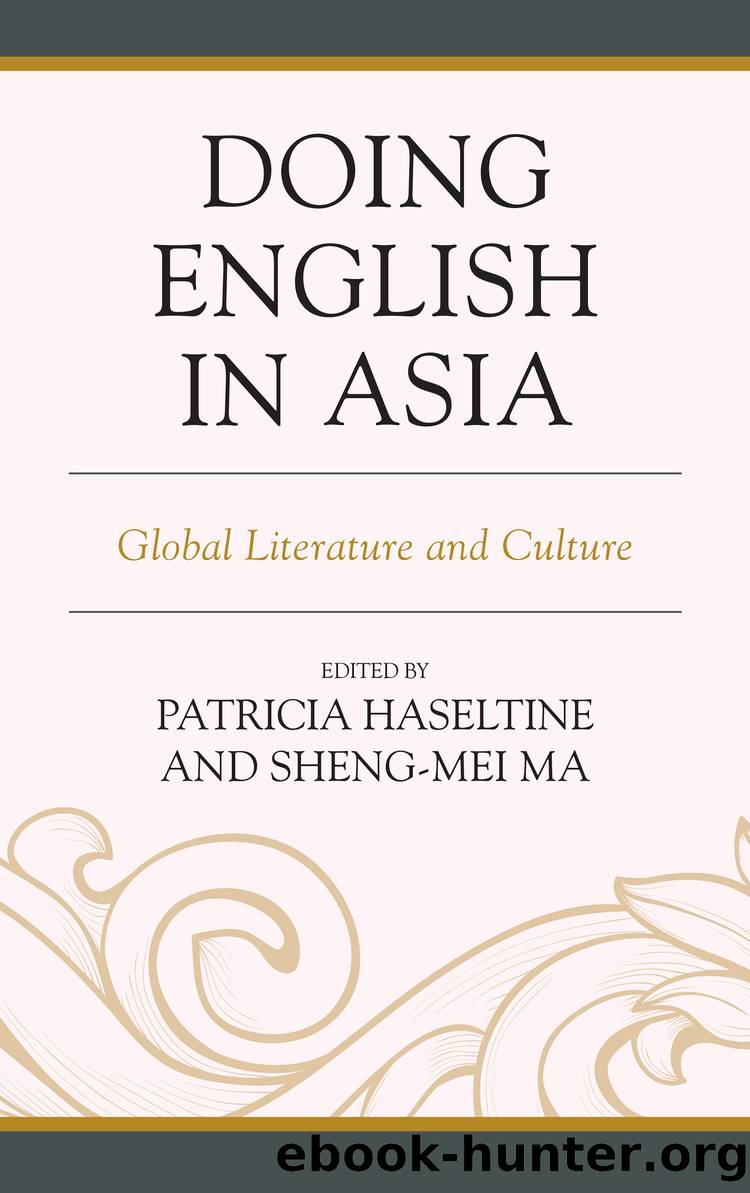Doing English in Asia by unknow

Author:unknow
Language: eng
Format: epub
Publisher: Lexington Books
Published: 2016-03-23T18:21:56+00:00
5
Teaching English Language and Literature in the Asia-Pacific Region
Environmental and Ecocritical Contexts
Iris Ralph
When I first moved to Taiwan, I took up a teaching position in the English Department in the College of Foreign Languages and Literatures at Tamkang University (TKU), an institute that is internationally recognized for its ecocriticism conferences, undergraduate and graduate courses, guest lectures, and summer seminars (hosted by TKUâs English Department). As an English literature scholar and an ecocritic, I was delighted to secure this teaching position as well as to learn that the department chair at the time, Peter I-min Huang, was one of Taiwanâs foremost ecocritics, a scholar who was and continues to be highly respected for his efforts in promoting ecocriticism, an area of inquiry that, as it is taught in English Departments, might be called âecocritical Englishâ and is broadly defined as âan environmental version of English Studiesâ (Kerridge 13).1 I looked forward to learning more about the environmental issues that were specific to Taiwan and China, so after I arrived in Taiwan I began to research those issues and bring attention to them in the English language and literature courses that I taught. I assigned reading and writing tasks that addressed, for example, the construction of the highly controversial fourth nuclear power plant, the loss of Taiwanâs coastal wetlands to the petrochemical industry, the high concentrations of industrial metals in agricultural soils, the illegal dumping of industrial waste in major tributaries, the proposed dam projects in the south, the bulldozing of farm lands to make way for industrial science parks in central Taiwan, and the ongoing cementing of Taiwanâs coastline (approximately 50 percent of which now is lined with cement tetrapods and other industrial-made sea-water barriers).
I had become interested in ecocriticism ten years earlier, when I enrolled in a doctoral degree program in the Department of English at the University of Texas and taught English language and literature courses in the English Department and Rhetoric and Writing Department. In 2005, after I received my doctorate, I returned to Australia and found work teaching ESL (English as a Second Language) and TESOL (Teaching English to Speakers of Other Languages) courses in several institutions. I taught primary and secondary school teachers from the Republic of Korea under a private TESOL teacher training program, exchange students from India enrolled in the Language Intensive Courses for Overseas Students (ELICOS) program at Northern Melbourne Institute of Technical and Further Education (NMIT), ânew arrivalâ immigrants from countries in Africa and the Middle East enrolled in the Migrant English Program (AMEP) at Victoria University, and âreturningâ senior citizen students enrolled in the Courses in Spoken and Written English (CSWE) certificate program at Moreland Adult Education (an adult community and education âneighborhood houseâ located in the northern Melbourne suburb of Coburg). Although the curriculum frameworks did not evidently or primarily reflect the concerns of ecocritics, they were flexible enough so that I could include in the syllabi for the courses assessment tasks that addressed environmental concerns. In doing
Download
This site does not store any files on its server. We only index and link to content provided by other sites. Please contact the content providers to delete copyright contents if any and email us, we'll remove relevant links or contents immediately.
Cecilia; Or, Memoirs of an Heiress — Volume 1 by Fanny Burney(32558)
The Great Music City by Andrea Baker(32019)
Cecilia; Or, Memoirs of an Heiress — Volume 2 by Fanny Burney(31956)
Cecilia; Or, Memoirs of an Heiress — Volume 3 by Fanny Burney(31942)
We're Going to Need More Wine by Gabrielle Union(19046)
All the Missing Girls by Megan Miranda(16028)
Pimp by Iceberg Slim(14507)
For the Love of Europe by Rick Steves(14121)
Bombshells: Glamour Girls of a Lifetime by Sullivan Steve(14075)
Talking to Strangers by Malcolm Gladwell(13370)
Norse Mythology by Gaiman Neil(13365)
Fifty Shades Freed by E L James(13241)
Mindhunter: Inside the FBI's Elite Serial Crime Unit by John E. Douglas & Mark Olshaker(9343)
Crazy Rich Asians by Kevin Kwan(9292)
The Lost Art of Listening by Michael P. Nichols(7506)
Enlightenment Now: The Case for Reason, Science, Humanism, and Progress by Steven Pinker(7313)
The Four Agreements by Don Miguel Ruiz(6765)
Bad Blood by John Carreyrou(6621)
Weapons of Math Destruction by Cathy O'Neil(6280)
